问候、打招呼Greetings-英语教学课件
英语口语 greeting PPT

英语问候语中,正式的通常有:
1.How do you do?(初次见面通常用语) 2.How are you?(比较熟悉的人之间用语) 3.How are you getting along with...?(你近来... 可好?) 4.How are you doing?(您工作还顺利吧?) 5.How is everything?(一切还好吧?) 6.How is your vacation/holiday(s)/weekend?( 假期怎么样?)
大家有疑问的,可以询问和交流
可以互相讨论下,但要小声点
1.How do you do? 2.How are you? 3.How are you getting
along with...? 4.How are you doing? 5.How is everything? 6.How is your vacation? 7.What's up? 8.Hello?Hi? 9.What's going on? 10.How is life? 11.How is it going?
No. 2 Hexi Street, Tianjin
Design your future name card.
First imagine the following things in 2020.
(1) Your address: ______________________________ (2) Your phone number: _________________________ (3) Your job: __________________________________ (4) Your position (职位): _________________________ (5) Your e-mail address: ________________________
unit 1 Greetings (问候)教案 PPT

18
Activities
1 Work Alone 2 Pair Work 3 Group Work
19
Work Alone
Listen to the dialogue, and decide whether the following statements are true (T) or false (F). ( ) 1. Bruce and Jane meet for the first time. ( ) 2. Bruce majors in art. ( ) 3. Jane’s QQ number is 245069.
Group 1 /i:/ and /ɪ/ Script
• This is a chick. (2) The sheep is on the hill.
4
Group 2 /e/ and /ɪ/ Script
• I have a new pen. (2) Please do not leave litter.
2
Highlights
Greetings
Pronunciation Listening and Speaking
Reading Grammar
Writing
3
Section A Pronunciation
I. Listen to the recording and tick the word you've just heard in each sentence.
人教版小学英语一年级基本问候语课件
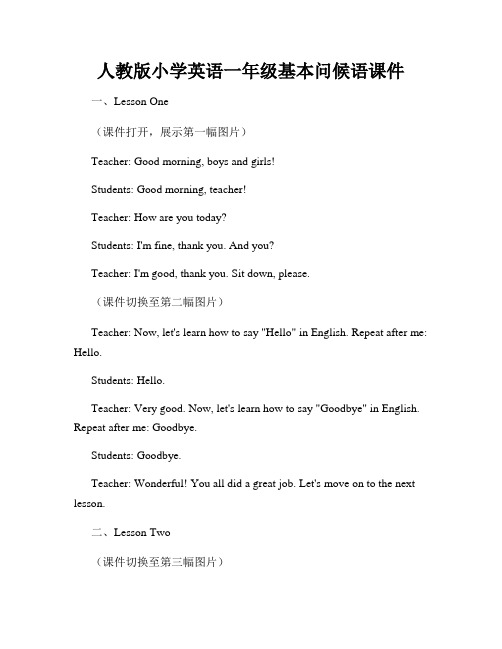
人教版小学英语一年级基本问候语课件一、Lesson One(课件打开,展示第一幅图片)Teacher: Good morning, boys and girls!Students: Good morning, teacher!Teacher: How are you today?Students: I'm fine, thank you. And you?Teacher: I'm good, thank you. Sit down, please.(课件切换至第二幅图片)Teacher: Now, let's learn how to say "Hello" in English. Repeat after me: Hello.Students: Hello.Teacher: Very good. Now, let's learn how to say "Goodbye" in English. Repeat after me: Goodbye.Students: Goodbye.Teacher: Wonderful! You all did a great job. Let's move on to the next lesson.二、Lesson Two(课件切换至第三幅图片)Teacher: Good morning!Students: Good morning, teacher!Teacher: How are you today?Students: I'm fine, thank you. And you?Teacher: I'm good, thank you. Today, we are going to learn how to ask "What's your name?" in English. Repeat after me: What's your name?Students: What's your name?Teacher: Excellent! Now, let's learn how to answer this question. Repeat after me: My name is [student's name].Students: My name is [student's name].Teacher: Great job, everyone! Keep up the good work.三、Lesson Three(课件切换至第四幅图片)Teacher: Good morning, boys and girls!Students: Good morning, teacher!Teacher: How are you today?Students: I'm fine, thank you. And you?Teacher: I'm good, thank you. Today, we are going to learn how to ask "How old are you?" in English. Repeat after me: How old are you?Students: How old are you?Teacher: Perfect! Now, let's learn how to answer this question. Repeat after me: I'm [student's age] years old.Students: I'm [student's age] years old.Teacher: Well done, everyone! You are all doing an amazing job.四、Lesson Four(课件切换至第五幅图片)Teacher: Good morning!Students: Good morning, teacher!Teacher: How are you today?Students: I'm fine, thank you. And you?Teacher: I'm good, thank you. Today, we are going to learn how to ask "Where are you from?" in English. Repeat after me: Where are you from?Students: Where are you from?Teacher: Excellent! Now, let's learn how to answer this question. Repeat after me: I'm from [student's country/city].Students: I'm from [student's country/city].Teacher: Amazing job, everyone! Keep up the great work.五、Lesson Five(课件切换至第六幅图片)Teacher: Good morning, boys and girls!Students: Good morning, teacher!Teacher: How are you today?Students: I'm fine, thank you. And you?Teacher: I'm good, thank you. Today, we are going to learn how to say "Thank you" and "You're welcome" in English. Repeat after me: Thank you.Students: Thank you.Teacher: Now, let's learn how to say "You're welcome". Repeat after me: You're welcome.Students: You're welcome.Teacher: Wonderful! You all did an excellent job. Keep practicing and you will become fluent in English.(课件结束)以上就是人教版小学英语一年级基本问候语课件的内容,通过课件的展示和老师的引导,学生们学会了如何用英语进行基本的问候和回答。
英语基本问候语课件

Letting someone know how many of you have missed them and how glass you are to see them again is a nice way to show your feelings Phrases like "I've missed you" or "It's great to see you again" can be heartfelt
03
Introduction
01
Learning how to introduce oneself and others in English is essential for any first meeting Common phrases like "Hello, my name is..." and "Nice to meet you" are essential
Inquiry about their well being
Asking about someone's health, family, or general well being is a sign of genius concern Simple phrases like "How's your family?" or "How's your health?" can be very meaningful
Making plans for the future
If appropriate, making plans to meet again in the future can be a nice way to end a visit on a positive note Phrases like "Let's meet again soon" or "I look forward to seeing you again" can be used
greetingsPPT课件

非正式场合:
• Hi/Hello 你好 !
• Good morning(afternoon/evening) 早上(下午,晚上) 好 !或直接说Morning/Afternoon/Evening!
• Good morning一般从早上6点到中午12点使用,Good afternoon通常从午饭后到下午6点用。晚上见面时,千万不能
8
• Good evenning!Miss Wang.I'm glad to see you.
• Me too.Good evenning! • How is it going? • Very well,thank you.And you? • Pretty good.
9
中西方不同问候方式所体现的文化差异
– 世界上各民族都有自己的生活和交往方式,比如再见面时打招呼的方法也有 不少区别。“吃了吗?”(Have you eaten your meal?)这是中国人在吃饭前 后打招呼的常用语。但如果这样和英美人打招呼,他们会以为你要邀请他们 去吃饭。再如,中国人常说“去哪儿?”(“Where are you going?”)和 “到哪 儿去了?”(“Where have you been?”)这也只是一种打招呼的形式而已,并 不需要实际的回答。但大部分讲英语的人听了可能会不高兴,因为他们以为 你要了解、介入他们的私生活。其实,汉语的“你吃了吗?”“你去哪儿?”就等 于英语的Hello 或Hi.
A:How do you do? 您好!
此句用于陌生人之间或初次见面的时候,意思是“您好!”
B:How do you do? 您好! A:How are you? 您好吗?
用于熟人之间的问候, 侧重询问对方的身体状况如何。
GreetingPPT课件
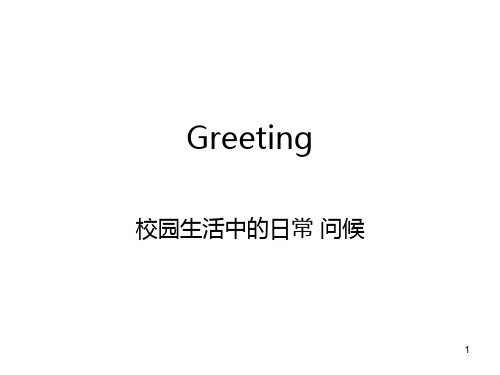
• 嗨有什么事吗? • 我们要谈一下功课。
那么午餐时在餐厅见! • 好的,拜拜。
15
情景八
• Eaten? • Not yet。 • Let’s have lunch together. • Ok.
16
• 吃了吗? • 还没。 • 那我们一起吃午饭吧。 • 好啊。
17
12
• 嗨简,什么风把你给吹来了? • 世界真小不是吗,进来可好啊? • 我正在一所大专就读,你呢? • 我正在一所高级职业学校就读
13
情景七
• A. Hi, what’s up? • B: We need to talk about the
assignment A: Meet you in the dining hall at lunch, then. A. Ok see you.
ask her out. A: Chances are slim.
8
• A. 嗨,有事吗? • B :Andy,你认识Mary吗?我想约她出去。
A: 机会很小。
9
情景五
• A. How are you doing? • B. Pretty bad. I broke up with Diana.
A: What? Again? What happened? B. It is a long story.
• A:还不错. • A:外面风好大喔。
B:这就是为什么我们叫这锦州。
3
情景二
• A: You look great. What’s new? B.I finally found my ideal girl!
4
• A: 你看起来气色很棒。有什么好事吗? • B: 我终于找到我理想中的女孩。
英语中如何打招呼(课堂PPT)
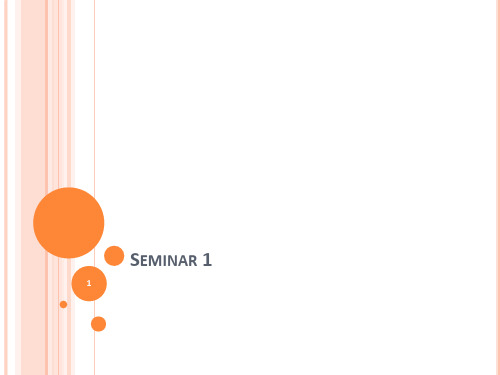
Say hi or hello
Say how do you do
Talk about the weather
Talk about salary
9
2020/4/7
In Chinese speaking communities, we often greet acquaintances or friends with expressions like “Where are you going?” or “have you eaten yet?”.
Jake: Yeah, me too!
Jake: What're you studying here?
Debbie: Journalism. I want to be a journalist. What about
you?
Jake: I'm doing law. But I'm thinking of doing business
26
2020/4/7
INTRODUCE YOURSELF
Self-introduction Andrew Wuhan, Hubei Province Football Rock and roll Photography Queensland University
27
2020/4/7
11
2020/4/7
姓、名?
Given name, surname, last name, family name, first name
Given name = first name Surname = last name = family name
12
2020/4/7
DIALOGUE 1
greetings问候语,打招呼

greetings
spoken
unspoken
formal
informal
Two kinds of greetings:
Formal
Informal
Hello!
How do you do!(初次见面) How are you? Nice to meet you!
回答
见到你很高兴
Which of the following words indicate (表明) the right attitudes towards cultural differences?
A. respect C. look down upon E. hate B. tolerate(容许) D. appreciate G. reject
the Spring Festival
Christmas Day
Thanksgiving
Table manners
What equipment do Chinese people use to have a meal?
chopsticks
What equipment do western people use to have meals?
People in different countries greet each other in different ways. Why?
Because of cultural differences, such as different languages, different habits, different customs and so on.
In the USA , people shake hands when meeting each other. In the USA
2020-2021学年鲁科版英语三年级上册Unit 1 Greetings Unit 1 Lesson 2 How are you? 鲁科版san课件
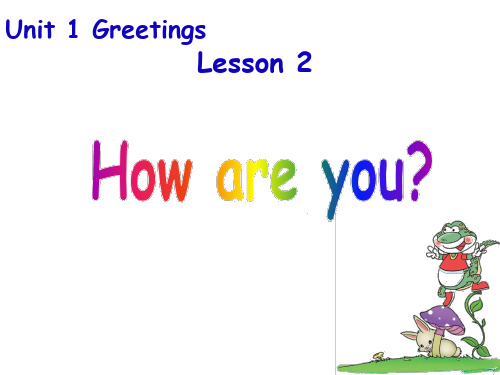
Good morning.
Good morning.
When we meet our friends in the morning, we often say…
(早上遇到熟悉的人,我们经常会说……)
Good morning.
What do they say to each other? (在这幅图中他们在热烈地说什么呢?)
(想一想,他们都会说些什么呢?)
Think and choose: What can they say?
(想一想,选一选:他们会说什么呢?)
Hello. √ I’m Jenny.
Hi. √
I’m Danny.
Good morning.√
How are you? √
I’m fine, thank you. And you? √
240、:3敏17而.1好4.学20,20不20耻:3下17问.1。4.。2072.1042.02:03210270.:1341.:2401270.1240.:230122002:301:32107:3.114:4.2102200:31:41
这醉人芬春芳去的春季又节回,,愿新你桃生换活旧像符春。天在一那样桃阳花光盛,开心的情地像方桃,在 45、不海要内为存它知的已结,束天而涯哭若,比应邻当。为Tu它es的da开y,始Ju而ly笑1。4, 72.01240.2J0u2ly0270.1T4u.2e0sd2a0y2,0J:3u1ly2104:3,122002:0371/:1441/2200:2301:41 花一这样醉美人丽芬,芳感的谢季你节的,阅愿读你。生活像春天一样阳光,心情像桃 56、莫生愁命前的路成无长知,已需,要天吃下饭谁,人还不需识要君吃。苦8时,3吃1分亏8。时T3u1e分sd1a4y-J, uJlu-l2y0174.1,42.022002J0uly 20Tuesday, July 14, 20207/14/2020
外研版三年级上册英语全册教学课件
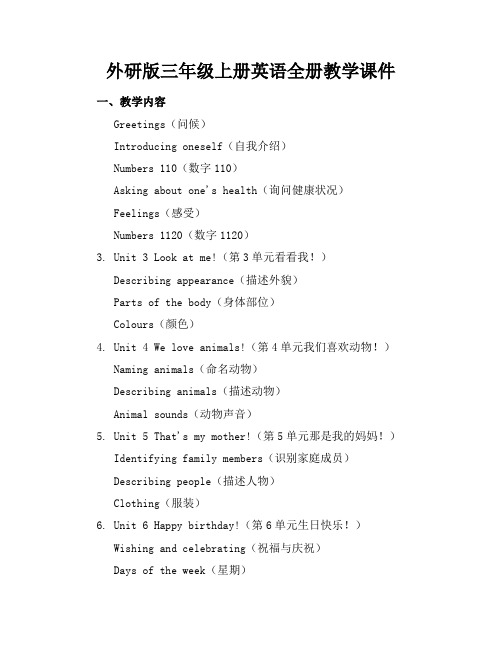
外研版三年级上册英语全册教学课件一、教学内容Greetings(问候)Introducing oneself(自我介绍)Numbers 110(数字110)Asking about one's health(询问健康状况)Feelings(感受)Numbers 1120(数字1120)3. Unit 3 Look at me!(第3单元看看我!)Describing appearance(描述外貌)Parts of the body(身体部位)Colours(颜色)4. Unit 4 We love animals!(第4单元我们喜欢动物!) Naming animals(命名动物)Describing animals(描述动物)Animal sounds(动物声音)5. Unit 5 That's my mother!(第5单元那是我的妈妈!) Identifying family members(识别家庭成员)Describing people(描述人物)Clothing(服装)6. Unit 6 Happy birthday!(第6单元生日快乐!)Wishing and celebrating(祝福与庆祝)Days of the week(星期)Months(月份)二、教学目标1. 能熟练运用基本的日常英语进行问候、自我介绍和询问健康状况。
2. 学会描述人物、动物、颜色、服装等,并能用英语进行简单对话。
3. 掌握数字120,并能进行简单的数数和计算。
三、教学难点与重点1. 教学难点:正确使用情态动词can进行提问和回答。
熟练掌握数字120的表达。
2. 教学重点:掌握基本的日常英语表达。
学会用英语描述人物、动物、颜色、服装等。
四、教具与学具准备1. 教具:PPT课件英语卡片挂图2. 学具:练习册彩笔贴纸五、教学过程1. 实践情景引入:通过问候、自我介绍等情景,引导学生学习英语。
高中英语第一课 打招呼 greeting幻灯片

1
Good morning Nice to meet you. I am greeting.
2
Greet
3
Good afternoon. Good evening.
4
Activity 3
Act and practice. 看图,依据图中场景与同伴打招呼。
1
2
In the Middle East 22
In the USA , people __s_h_a_k_e__h_a_n_d__s_
when meeting each other.
In the USA 23
When Dutch people meet, they _k_i_s_s_ each
other on one cheek and then the other.
differences?
A. respect
B. tolerate(容许)
C. look down upon D. appreciate
E. hate F. understand G. reject
ABDF
40
Though we have different cultures and customs, we should learn to respect each other and live in peace and harmony.
Pleased to meet you! Pleased to meet you!
13
Greeting
Response
• Hello
• Hello
• Hi / hey
• Hi
• What’s up? • What’s up?
Greetings

中西方不同问候方式所体现的文化差异
– 在英语国家,人们通常将谈论天气作为问候语,如,“Lovely day.isn’t it?”(天气挺好,是吧!),“It’s so
cold today,isn’t it?”(今天真冷,对吧?),“It’s extremely windy today,isn’t it?”(风真大。不 是吗?)。这种语言现象主要归因于英国多变的天气。由于英语和汉语一些习惯性的问候语在 内容方面存在差别,所以在使用时应考虑文化差异,以免产生不必要的尴尬。例如。在英 语中“你吃了吗?”并不是一种问候语,而是男士向女士发出的邀请。
unit 1 greetings
第1页,共33页。
Greetings in different counties
America: Hello! / Hi! / How are you going?
Australia: Good day! China: Hi! / Have you eaten yet?
• Good morning一般从早上6点到中午12点使用,Good afternoon通 常从午饭后到下午6点用。晚上见面时,千万不能用Good night,因 为Good night 只用于即将分别的场合,有Good-bye的意思,而应该 用Good evening。
• 需提醒的是“Good night!” 不是一句见面时的问候语,而是一句告别语
第12页,共33页。
情景对话扩展
• A:How do you do! • B:How do you do! • A:What can I do for you? • B:Can you tell me where is the way to
- 1、下载文档前请自行甄别文档内容的完整性,平台不提供额外的编辑、内容补充、找答案等附加服务。
- 2、"仅部分预览"的文档,不可在线预览部分如存在完整性等问题,可反馈申请退款(可完整预览的文档不适用该条件!)。
- 3、如文档侵犯您的权益,请联系客服反馈,我们会尽快为您处理(人工客服工作时间:9:00-18:30)。
❖ 适用于第一次见面:
-Nice/Glad/Good to meet you. 很高兴见到你。
-Nice to see you,too!
我也是!
-How do you do? -How do you do?
你好! 你好!
❖ 有一阵未见的熟人:
-Long time no see! 很久不见! -yeah,how are you getting along?
Watch the video 情景模拟
✓Listen and guess what they say
✓Read after the video
Greetings!
Make dialogue with your partner 与小伙伴对话
A: Good morning. How are you today? B: Pretty good, thanks. How about you? A: How are you doing? B: I'm doing fine / OK / pretty well / great /super / terrific / just so-so.
-I'm fine,thank you, and you?-How's everything? 一切都好? -Pretty good/Not bad. 挺好的/过得去。
-What's up/new/happening? 怎么样? -Not much. / Nothing much. 没什么。 / Nothing in particular. / Nothing special.
A: How have you been? B: I've been all right. I've been really busy.
A: What's new? / What's up? B: Not much. / Nothing much. / Nothing in particular. / Nothing special.
yours 第二人称
his 第三人称
hers 第三人称
it
第三人称
ours 第一人称
yours 第二人称
theirs 第三人称
Greeting manners in China
中国式打招呼
吃了吗?
hello!
Different expressions in different occasions 不同场合不同表达
是的,最近如何?
-How have you been?
这段时间过得怎样?
-I've been all right/busy.
还不错/很忙。
❖ 碰到一个不愿见到的人:
It's a small world,isn't it?
(冤家路窄)世界真小,不是吗? ❖ 意想不到见到熟人:
-What a small world! 世界可真小啊!
NEMO
GREETINGs
老外寒暄篇
主格 形容词性物主 宾格 代词
单数 我
I
my
me
你 you your
you
他 he his
him
她 she her
her
它 it its
it
复数 我们 we our
us
你们 you your
you
他们 they their
them
名词性物主 代词
mine 第一人称
Good monring/afternoon/evening 一天到晚的不同问好
Good morning!
Good evening!
5-12 Good afternoon! 17-20/21
13-17
Good night!
22-24
❖ 任何时候都可以用,但比较见外:
-How are you? 你好吗?
Thanks for your listening!
知识回顾Knowled ge Review
祝您成功!
